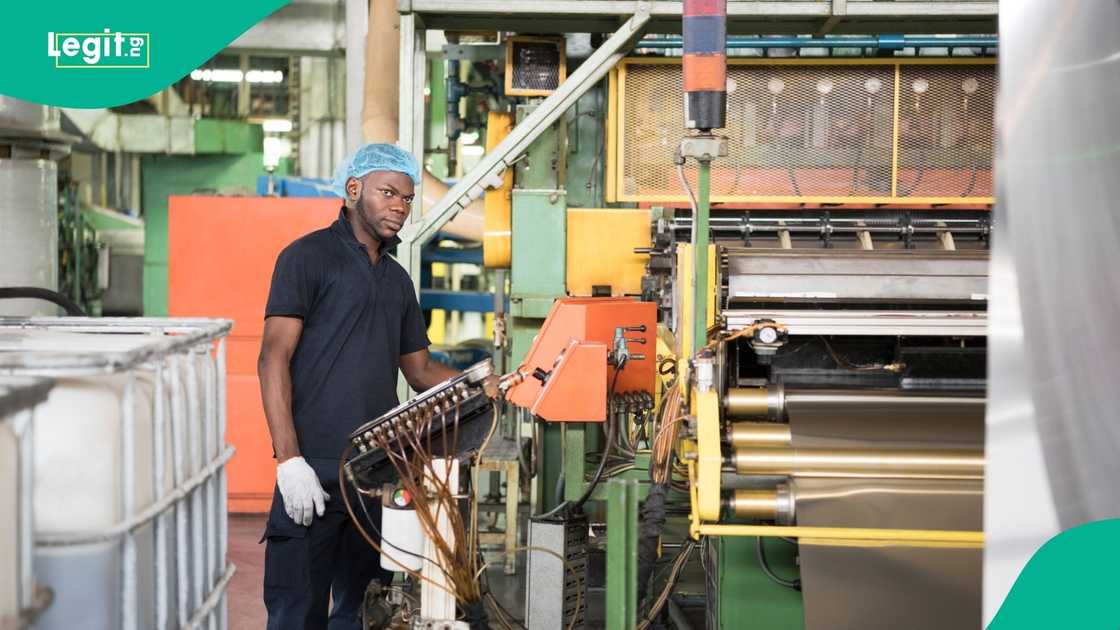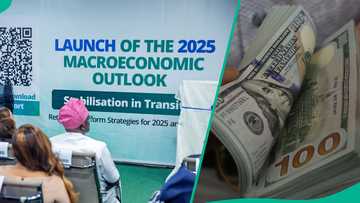Manufacturers Project 10% Growth in 2025, Expect New Minimum Wage to Improve Consumer Spending
- The manufacturing sector is projecting a 10% growth in 2025 on the backdrop of a stable forex market
- They project that the implementation of the minimum wage across Nigeria will improve purchasing power and consumer spending in the year
- Leaders in the industry called on the government to address teething challenges like rising energy costs and multiple taxation in order to ease the business environment
Legit.ng journalist Ruth Okwumbu-Imafidon has over a decade of experience in business reporting across digital and mainstream media.
Key players in Nigeria’s manufacturing sector have expressed optimism that the sector will bounce back in 2025.
They also project increased consumer spending when the government fully implements the new minimum wage of N70,000 at all levels. This would improve business sales and turn the tide.

Source: Getty Images
In a BusinessDay report, the Nigerian Association of Chambers of Commerce, Industry, Mines, and Agriculture (NACCIMA) Director-General Sola Obadimu expressed optimism that inflationary pressures would lessen and the foreign exchange market would show more stability.
Obadimu noted that forex volatility and declining consumption were among the major issues the industry faced in Nigeria in 2024, and once the issues are resolved, they can expect the tides to turn.
According to him, stable forex would help manufacturers plan their inputs and outputs without shockers along the way.
It would also reduce the inflation rate and result in more accommodating monetary policies and interest rates from the Central Bank of Nigeria.
EFEMs bring stability to the FX market
Since the CBN launched the Electronic Foreign Exchange trading platform (EFEMs) in December 2024, market volatility has dropped, with the naira even appreciating 7% within the first month of operation.
Data from the apex bank reveals that the naira now often records flat rates across all markets, including the Nigeria Autonomous Foreign Exchange Market (NAFEM).
10% growth in manufacturing sector
Director General of the Manufacturers Association of Nigeria (MAN) also projected 10% sector growth. His projection was based on a stable forex market and a review of energy costs and government taxes.
Mr Ajayi noted that lower energy costs and the passing of the tax reform bills will ease pressure on manufacturers. When combined with the implementation of the N70,000 minimum wage across all states, consumers will have more money to spend.
He said all of these will combine to trigger a 10% growth in the manufacturing sector.
Price stability will engineer growth
The president of the Lagos Chamber of Commerce and Industry (LCCI), Gabriel Idahosa, projected moderate growth in the sector in a January 1, 2025 note.
He commended government policies encouraging local production and discouraging import reliance and noted that with such policy backing, a stable forex market and reduced energy costs, they could expect growth in the manufacturing sector.

Read also
“Interests of consumers”: Airtel CEO finally reacts to approved increase in call, data tariff
Idahosa called on the government to help promote price stability and improve the ease of doing business in Nigeria by addressing the teething challenges facing manufacturers.
He observed that some subsectors, like food processing and textiles, have domestic demand to drive their growth, and with government support, they will record a fantastic 2025.
Sectors that drove 2024 GDP growth
In related news, Legit.ng reported the top six sectors that drove Nigeria's GDP growth in 2024.
According to the NBS GDP report, the Nigerian economy grew by 3.46% (year-on-year) in real terms, with an estimated value of N20.12 trillion.
The growth rate was higher than 2023, with the non-oil sector at the forefront, and the Services sector topping the chart.
The manufacturing sector was not among the top performers due to several challenges that plagued the industry in 2024.
PAY ATTENTION: Сheck out news that is picked exactly for YOU ➡️ find the “Recommended for you” block on the home page and enjoy!
Source: Legit.ng




